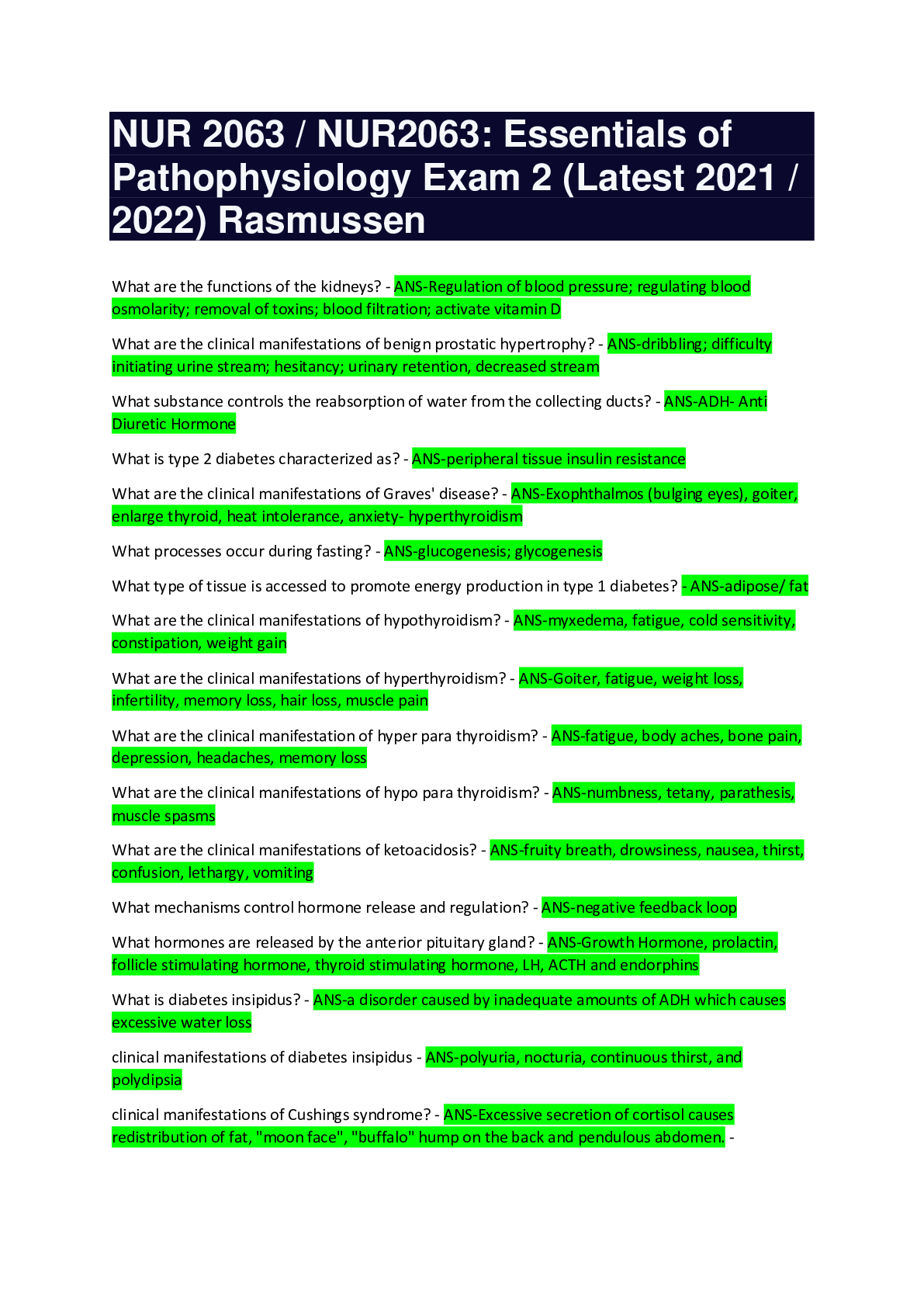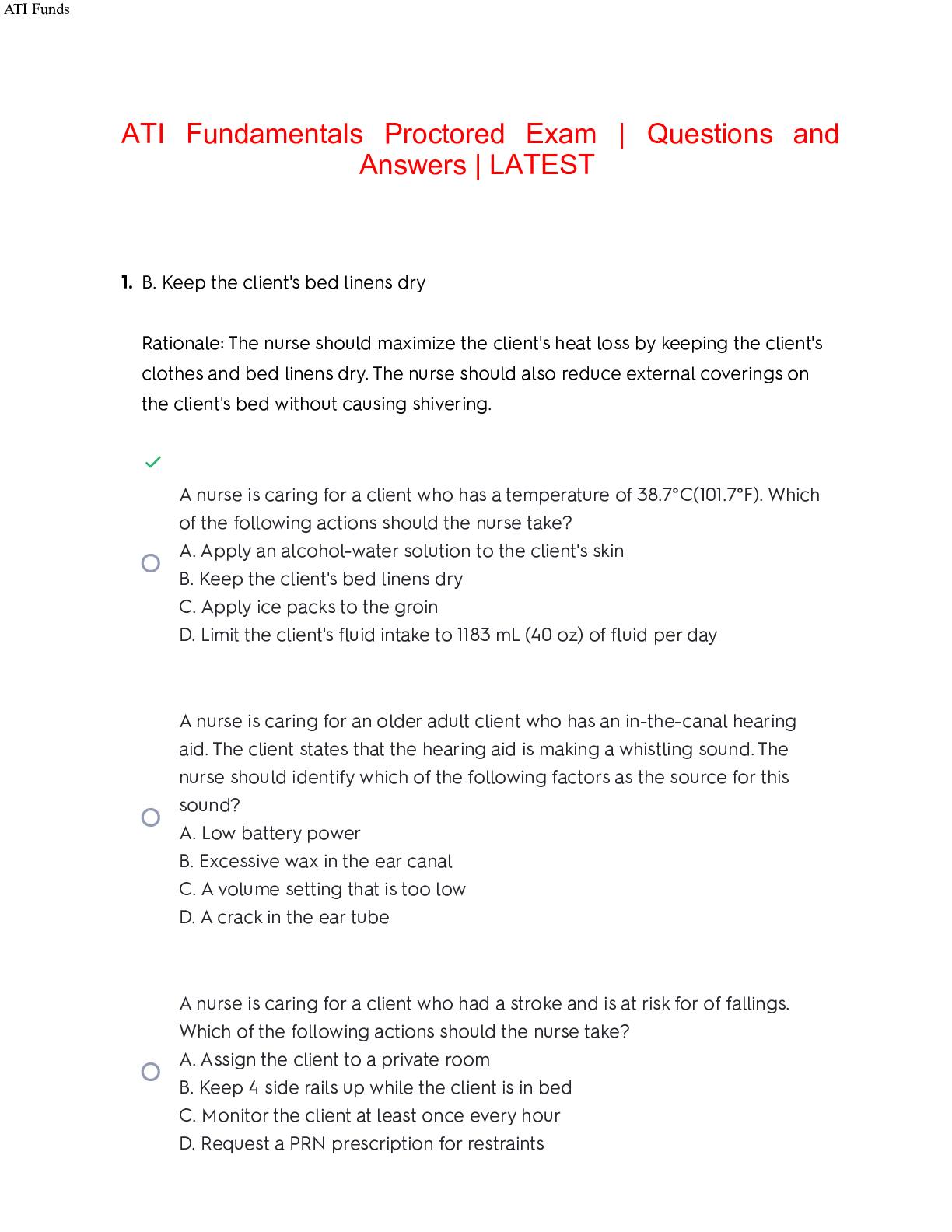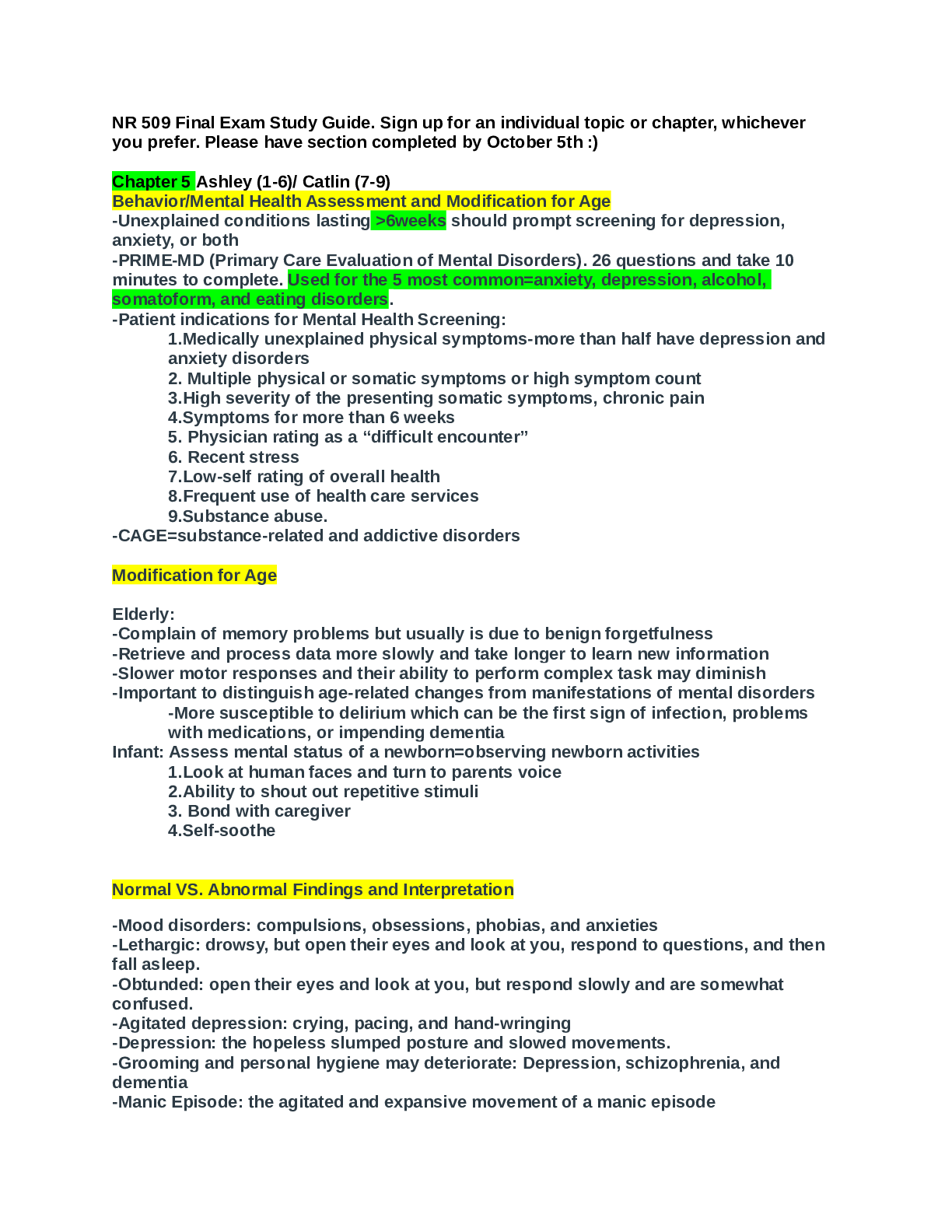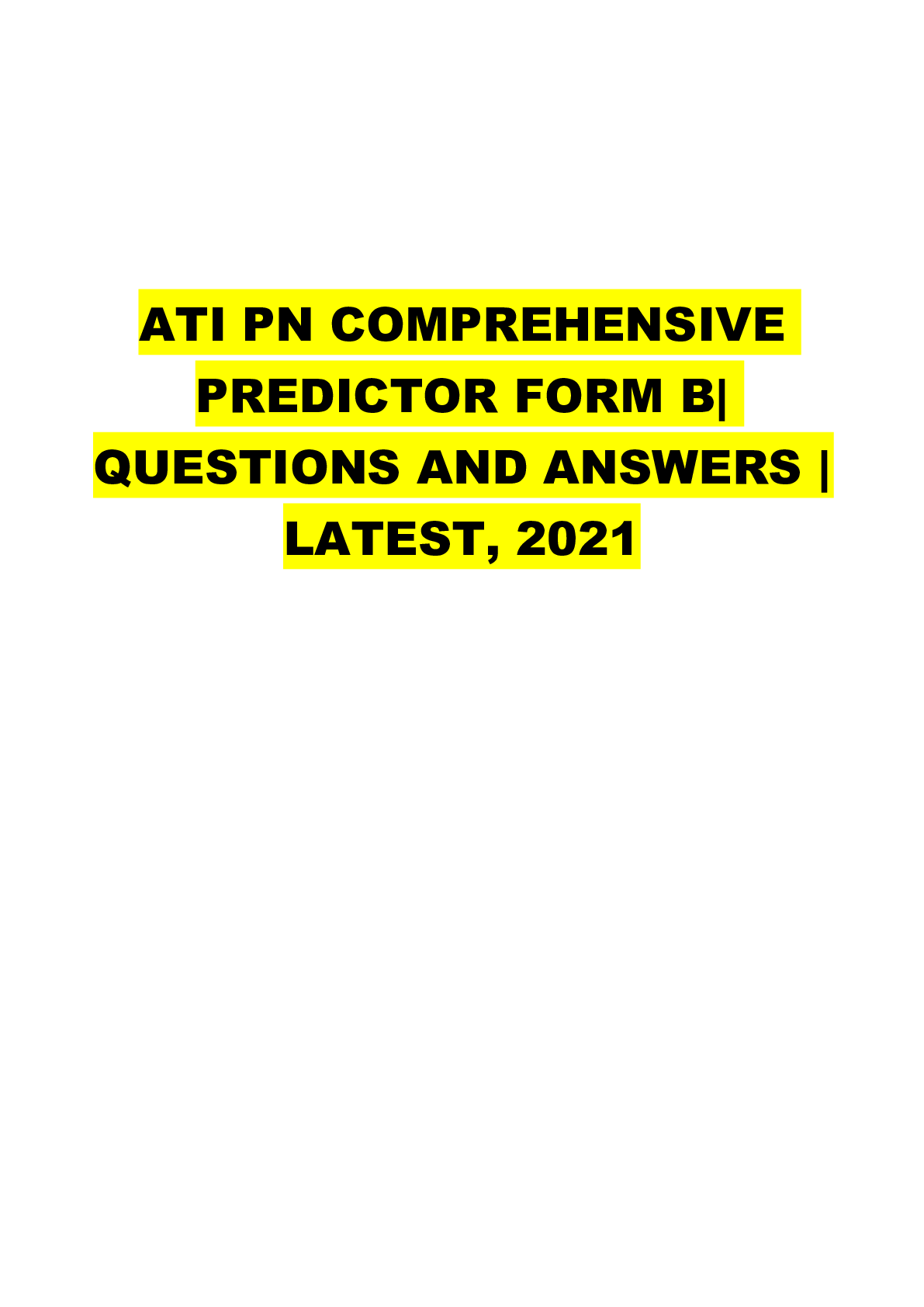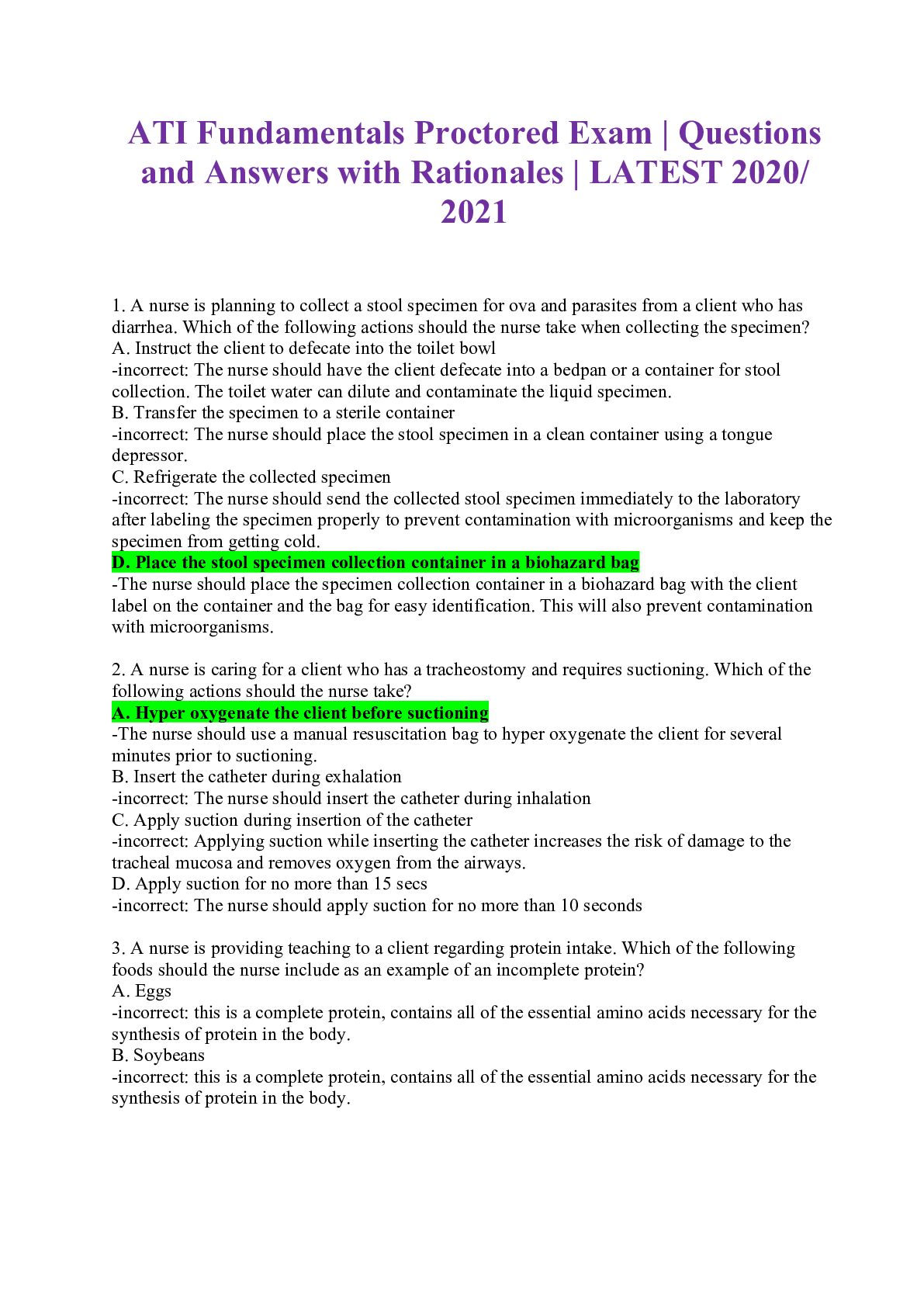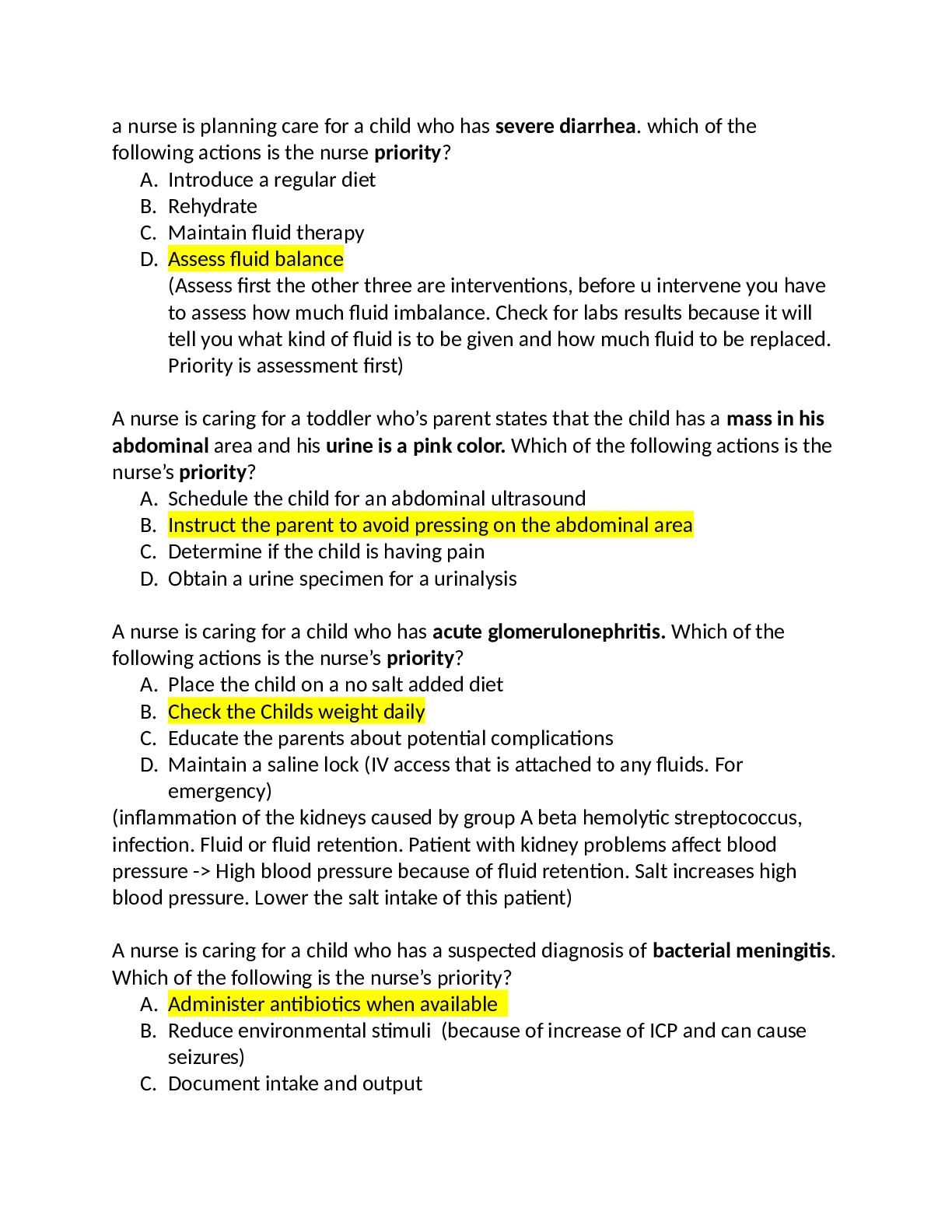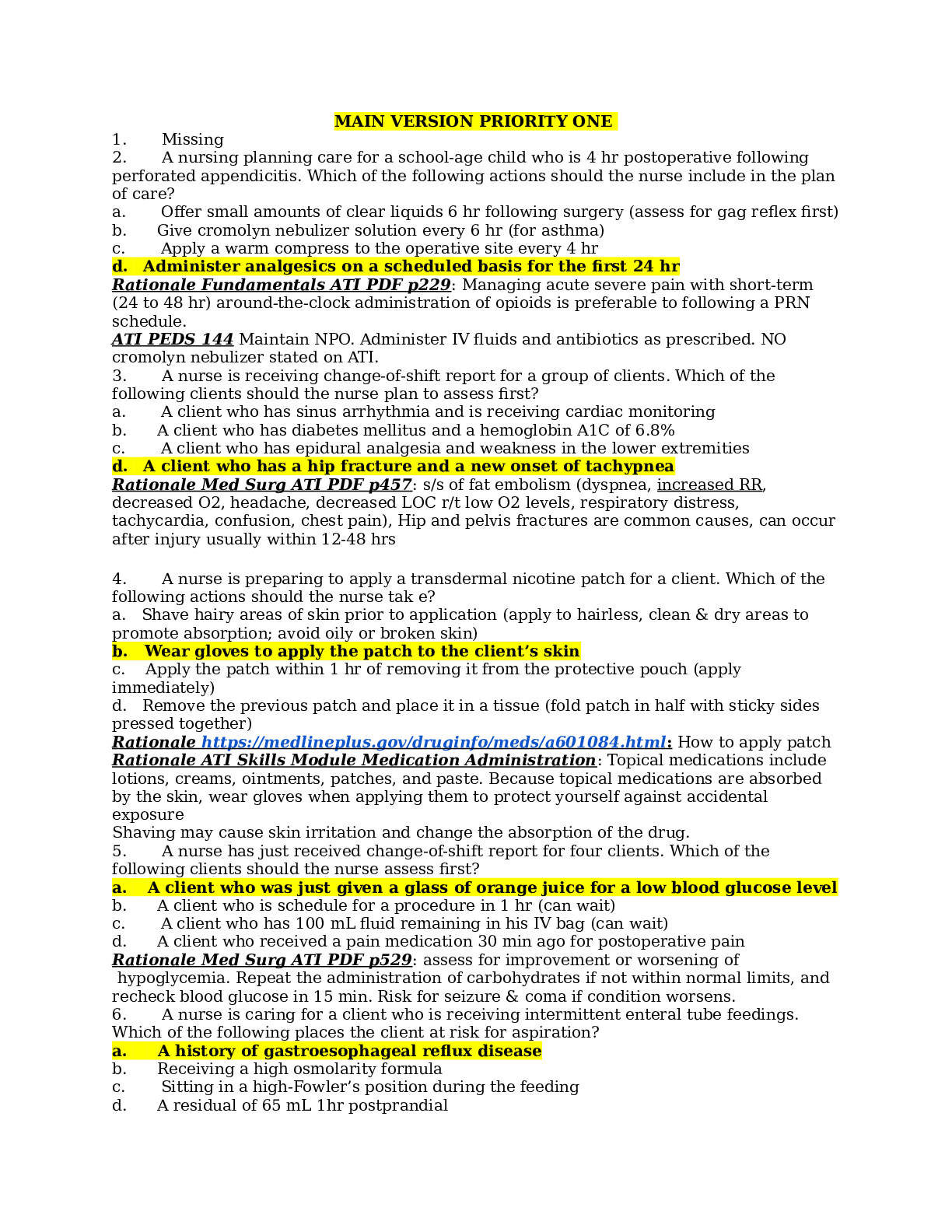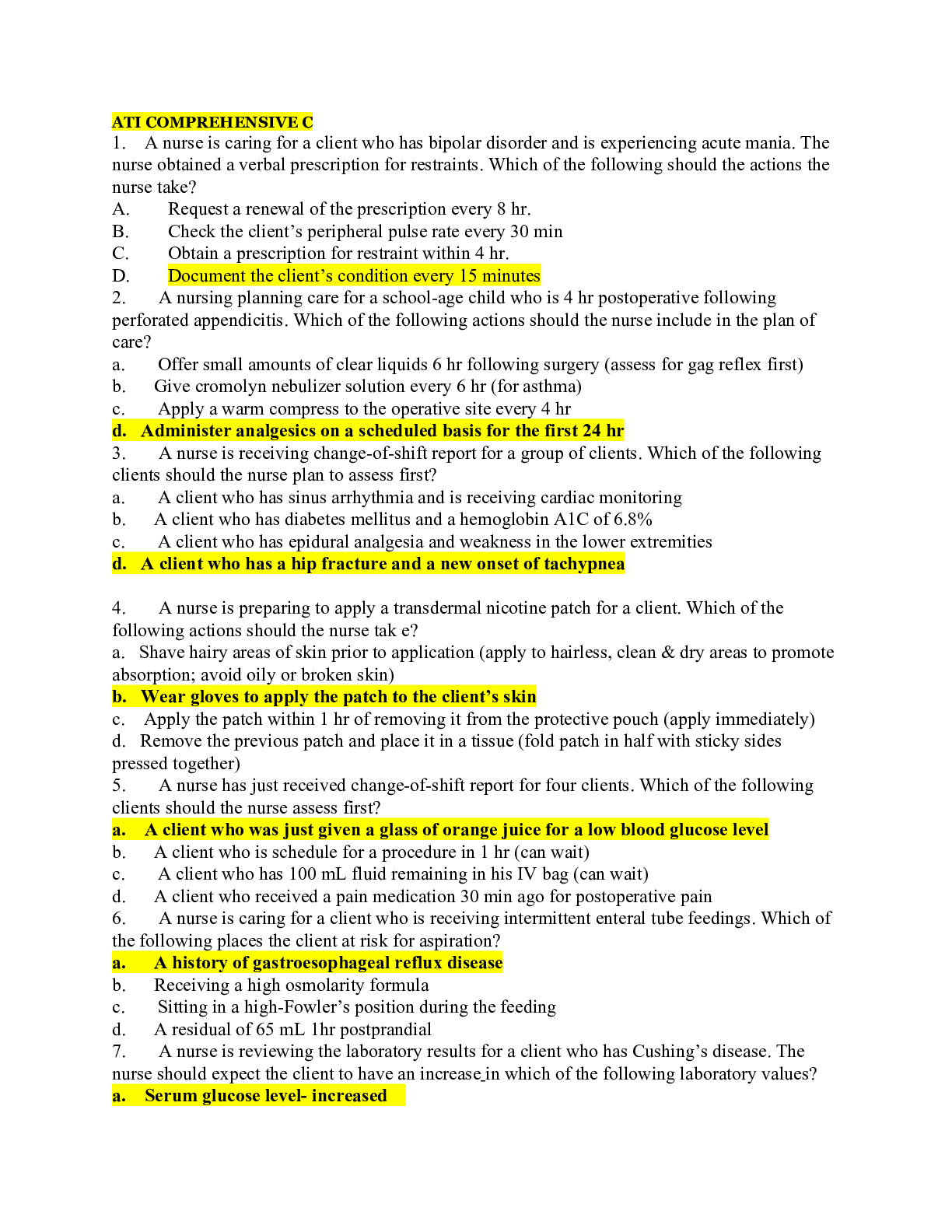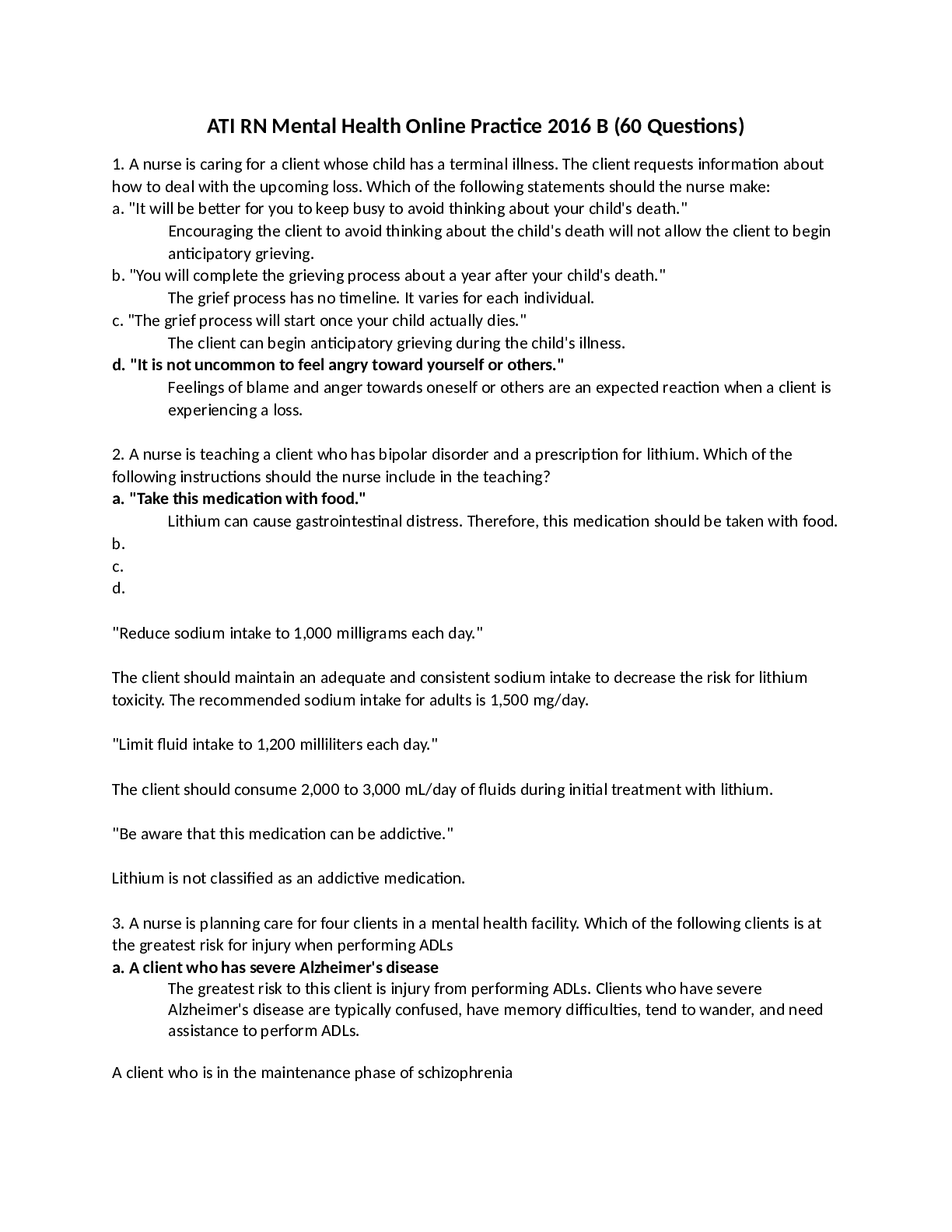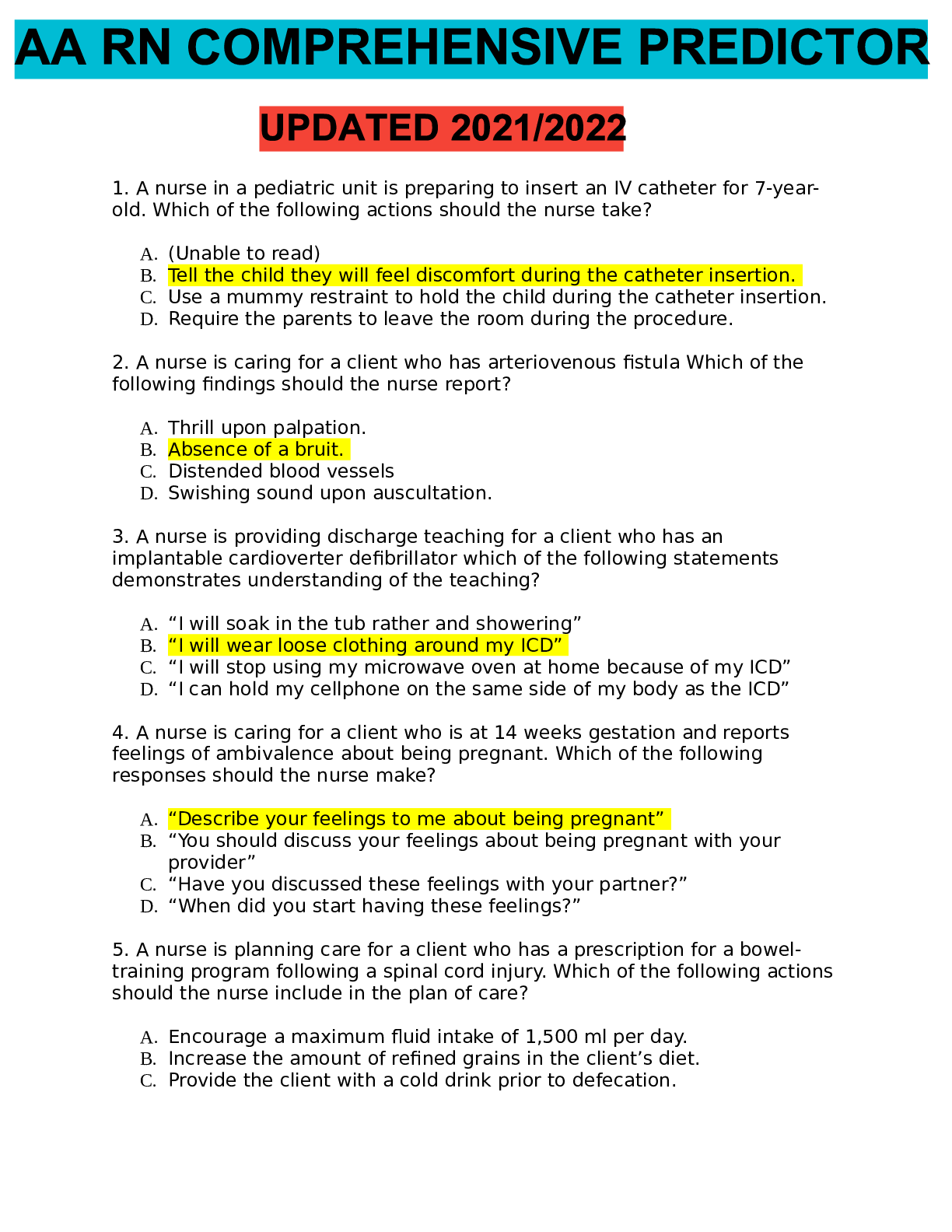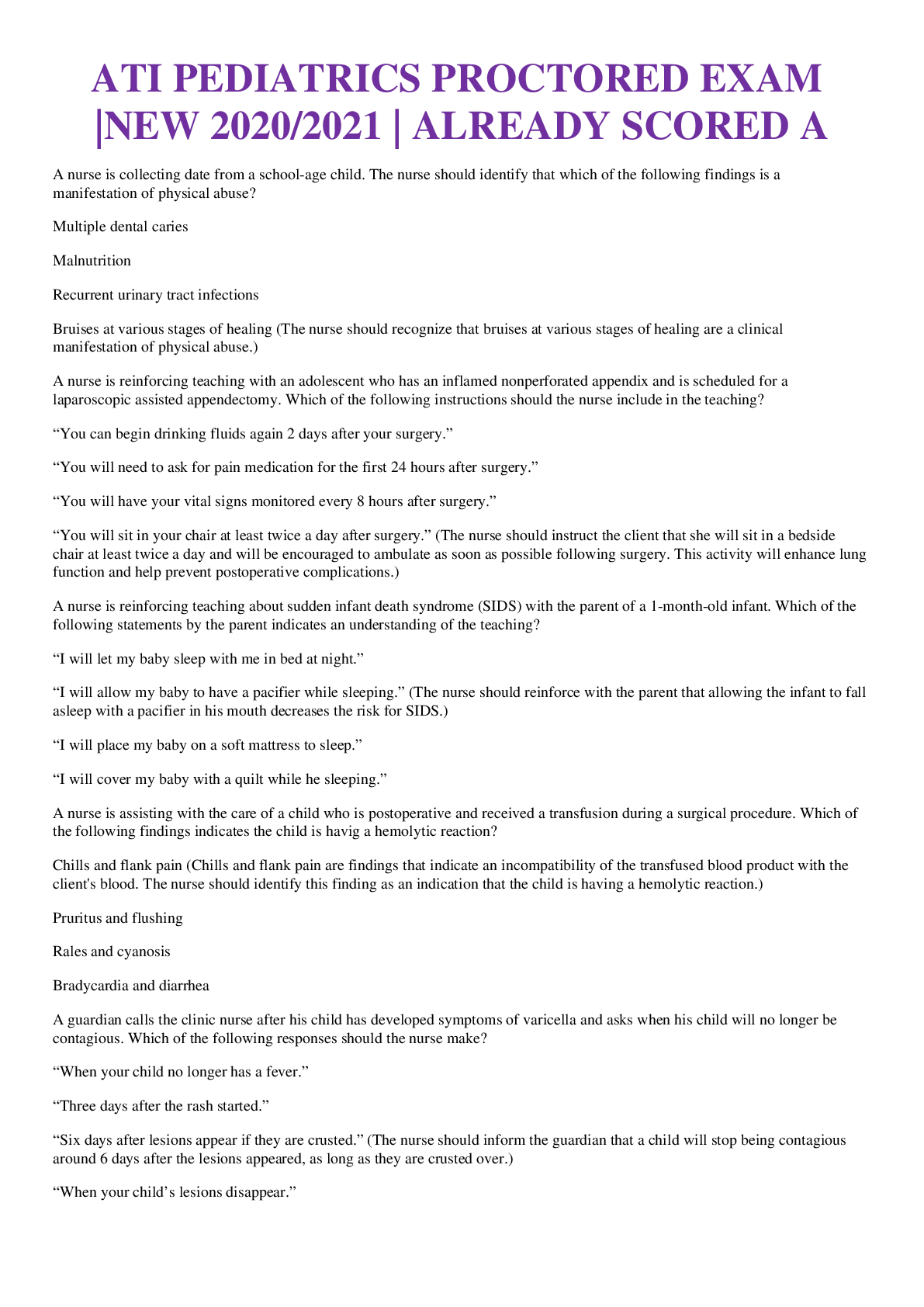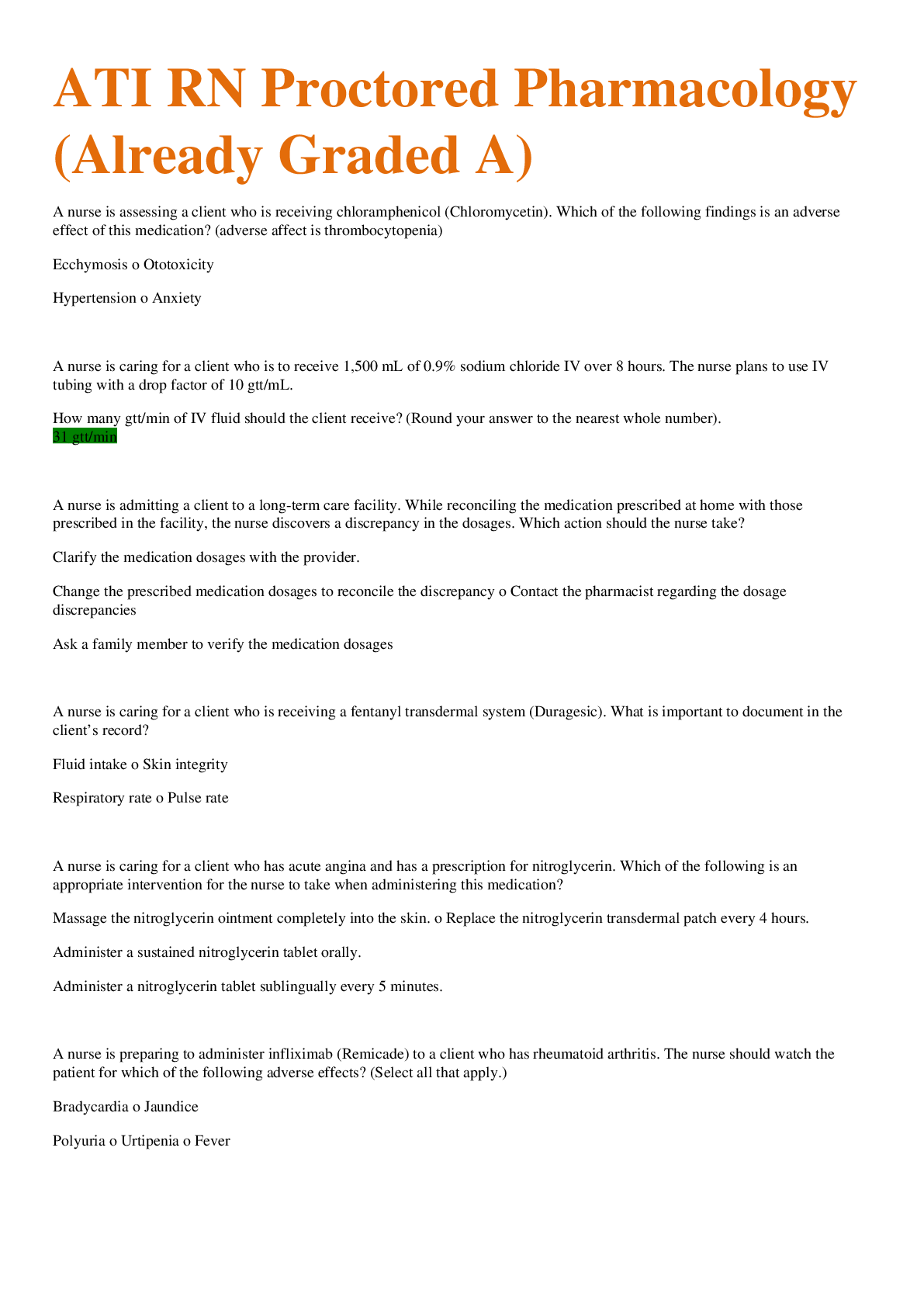*NURSING > EXAM PROCTORED > ATI Fundamentals Proctored Exam | Questions and Answers with Rationales | LATEST 2021/ 2022 (All)
ATI Fundamentals Proctored Exam | Questions and Answers with Rationales | LATEST 2021/ 2022
Document Content and Description Below
ATI Fundamentals Proctored Exam | Questions and Answers with Rationales | LATEST 2021/ 2022 A nurse on a medical-surgical unit is washing her hands prior to assisting with a surgical procedure. Whi... ch of the following actions by the nurse demonstrates proper surgical handwashing technique? A. The nurse washes each part of her hands with 5 strokes. B. The nurse washes from the elbows down to the hands. C. The nurse holds her hands higher than her elbows while washing. D. The nurse uses minimal friction when washing her hands. C. The nurse holds her hands higher than her elbows while washing. Rationale: The nurse who is performing a surgical handwashing technique should wash while holding her hands higher than the elbows so that water and soapsuds can drain away from the clean area toward the dirty area. A nurse is caring for a client who has the head of his bed elevated to a 45° angle with his knees slightly flexed. Which of the following positions should the nurse document for the client? A. Sims' B. Prone C. Supine D. Fowler's D. Fowler's Rationale: This describes Fowler's position. Although various definitions exist for Fowler's position, generally a low Fowler's position means 30° of elevation, semi Fowler's is 45° to 60°, and high Fowler's is 60° to 90° of elevation. A nurse is caring for a client who requires ventilatory assistance with breathing following a motor vehicle crash. The nurse should suspect an injury to which of the following parts of the brain? A. Hypothalamus B. Cerebral cortex C. Brainstem D. Cerebellum C. Brainstem Rationale: he nurse should identify an injury to the medulla and pons of the brainstem for a client who is experiencing difficulty with breathing. The brainstem serves as the respiratory control center, and a neurological injury can impair this center and inhibit respiratory effort. A nurse observes an assistive personnel (AP) preparing to obtain blood pressure with a regular-sized cuff for a client who is obese. Which of the following explanations should the nurse give the AP? A. "The reading will be inaudible if the cu is too small for the client." B. "The width of the cu bladder should be 75% of the circumference of the client's arm." C. "As long as the cu will circle the arm, the reading will be accurate." D. "Using a cu that is too small will result in an inaccurately high reading." D. "Using a cuff that is too small will result in an inaccurately high reading." A nurse is caring for a client who has emphysema. The client has not stopped smoking cigarettes and states, "It's too late for me to quit." Which of the following actions should the nurse take? A. Assist the client in finding local smoking- cessation assistance programs B. Tell the client that she will be all right aer receiving medical care C. Inform the client that she must stop smoking or the provider will not be able to care for her D. Advocate for the client by supporting her statement about not quitting A. Assist the client in finding local smoking- cessation assistance programs A nurse is caring for a client who is receiving IV therapy via a peripheral catheter. The nurse should identify that which of the following findings is an indication of infiltration? A. Redness at the infusion site B. Edema at the infusion site C. Warmth at the infusion site D. Oozing of blood at the infusion site B. Edema at the infusion site Rationale: Edema due to fluid entering subcutaneous tissue is an indication of infiltration. A nurse is preparing to administer a bolus feeding to a client through an NG tube and observes that the exit mark on the tube has moved since the last feeding. Which of the following actions should the nurse plan to take? A. Auscultate over the stomach while injecting air B. Request an X-ray of the client's abdomen C. Place the head of the client's bed in a flat position D. Administer the feeding if the pH of the aspirated contents is >6 B. Request an X-ray of the client's abdomen Rationale: The nurse should request an X-ray to verify the placement of the NG tube both after the initial insertion of the tube and if displacement of the tube is suspected. The nurse should verify NG tube placement prior to administering a bolus feeding. A nurse is teaching an assistive personnel (AP) about proper hand hygiene. Which of the following statements by the AP indicates an understanding of the teaching? A. "There are times I should use soap and water rather than an alcohol-based rub to clean my hands." B. "I will use cold water when I wash my hands to protect my skin from becoming too dry." C. "I will apply friction for at least 10 seconds while washing my hands." D. "Aer washing my hands, I will dry them from the elbows down." A. "There are times I should use soap and water rather than an alcohol-based rub to clean my hands." Rationale: While alcohol-based hand rubs are as effective as soap and water in providing proper hand hygiene, the Centers for Disease Control and Prevention recommend washing hands with soap and water at certain times, such as when the hands are visibly soiled with dirt or body fluids. A nurse is collecting a specimen for culture from a client's infected wound. Which of the following actions should the nurse perform? A. Wear sterile gloves when collecting the spe [Show More]
Last updated: 2 years ago
Preview 1 out of 49 pages
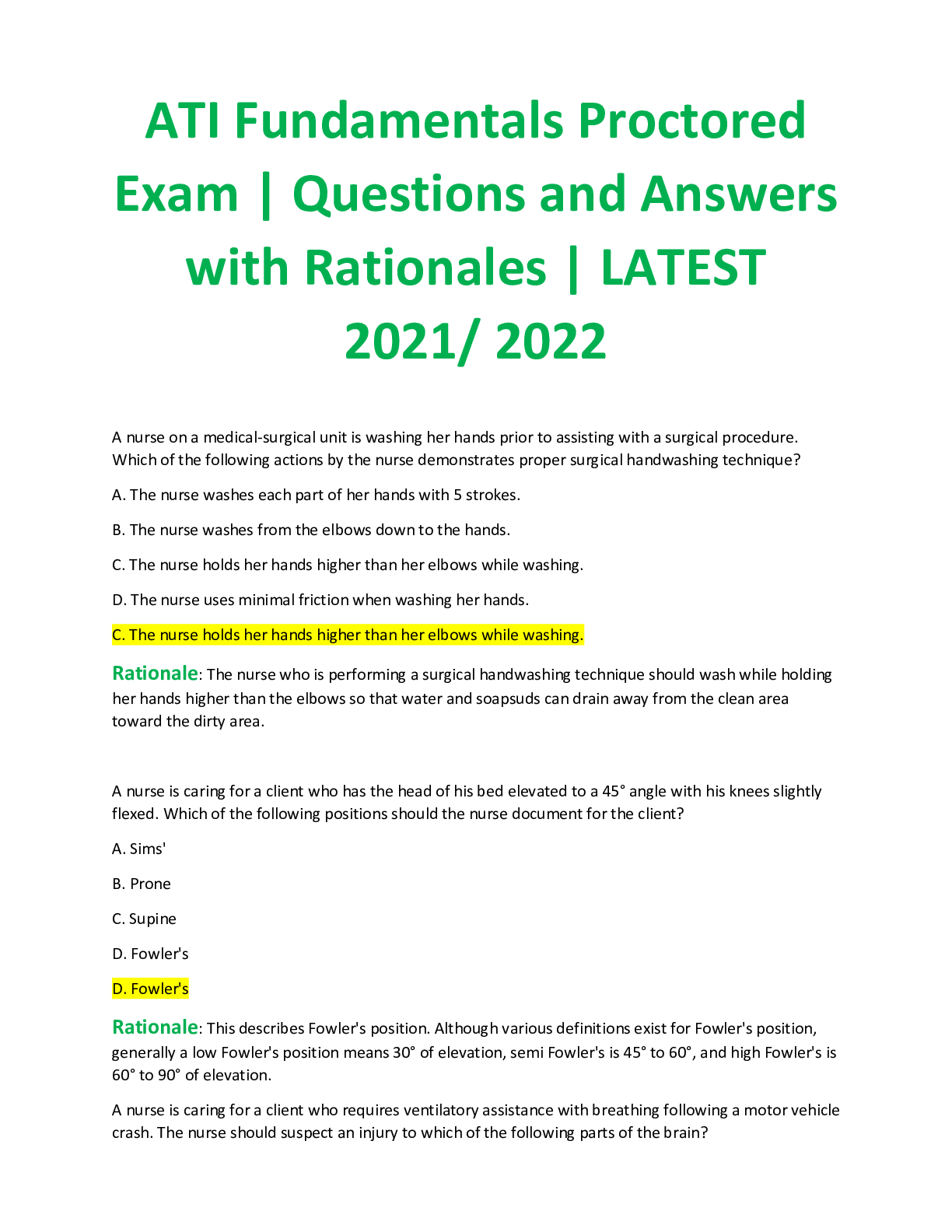
Buy this document to get the full access instantly
Instant Download Access after purchase
Buy NowInstant download
We Accept:

Reviews( 0 )
$16.00
Can't find what you want? Try our AI powered Search
Document information
Connected school, study & course
About the document
Uploaded On
Sep 01, 2021
Number of pages
49
Written in
Additional information
This document has been written for:
Uploaded
Sep 01, 2021
Downloads
0
Views
135


.png)

